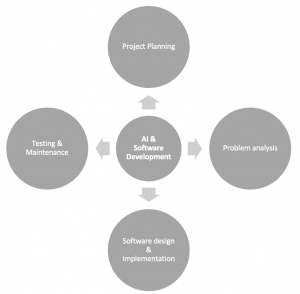AI: The next step in Software Development
AI has been revolutionizing businesses worldwide, from healthcare to banking, from automobiles to logistics. It’s innovations are developing very quickly and growing significantly on a global scale. AI refers to technologies that make it possible to equip computer systems based on algorithms with human abilities such as thinking, learning, problem-solving, etc., to make them intelligent and thereby help people to carry out different tasks.
With advances in machine learning, natural language processing, and data analysis, also in the world of software development, technology is changing rapidly and AI is leading the way. The global AI market reached USD 93.5 billion in 2021 and will expand at a growth rate of 38.1% annually by 2030. Innovations such as Edge AI, computer vision, decision intelligence (DI) and machine learning (ML) are shaping the market in the years to come. Additionally, robots are increasingly penetrating our everyday lives. And the current research suggests that this trend will continue in the coming years when robots and drones can take on more and more tasks in a meaningful way. These advances are related to the popularity and widespread use of AI & its promises of impressive growth opportunities.
The aim of AI is to create machines that can work and react like humans. However, AI is not just about creating human-like machines; it is also about making machines that can work better than humans. For example, a machine is able to process data much faster than a human can & also remember more information than a human can.
Since AI offers great potential for different areas, it is no wonder that its use cases are becoming more diverse with each passing year. AI solutions are already helping with:
- Business process automation
- Automated document creation
- Management of production processes
- Predictive Maintenance
- Customer Analytics
- Risk management
- Supply chain management
- Personalized service delivery
- Software development
Since its inception, AI has made significant progress in software development. Early successes included creating programs that could play checkers and chess, as well as solve simple mathematical problems. In recent years, AI has been used to develop more complex applications such as autonomous vehicles, facial recognition systems, and machine translation. Looking to the future, AI will continue to play an important role in software development. With the rapid advancements being made in machine learning and natural language processing, there is no limit to what AI can achieve. As we move forward into the next era of computing, it is exciting to think about all the new possibilities that AI will enable us to realize. Let’s explore how AI is impacting software development and how it will continue to revolutionize the industry in the years ahead.

Software development aka application development consists of winding together instructions for one or more programs that carry out required tasks or actions. The development team carries the task of translating problem-solving processes & algorithms into program code. Basically, we’ve known the classic methods of software development such as the agile and waterfall methodology. However, AI development works differently than classic software development. In AI development, data plays a central role – it is the center. In AI software development the behavior of AI depends on the self-training with the data. In the classic approach, the programmer had to set the rules himself, something that isn’t possible with AI development.
With AI, developers can create smarter and faster algorithms that can more accurately comprehend our intentions and behaviors within their applications. AI platforms promise faster development, more accurate prediction of user needs and behaviors, and continuously improving algorithms for data processing. This helps developers automate various tasks, from code quality analysis to bug fixing & save time on repetitive tasks. For example, if a developer needs to fix a bug that occurs often, they can train an AI system to automatically detect and fix that bug. This frees up the developer’s time so they can focus on more important tasks.
AI can also improve the quality of code. By using AI-powered static code analysis tools, developers can identify potential errors and bugs before they even write any code. This not only saves time and money by preventing buggy code from being deployed, but it also helps improve the overall quality of the software.
AI can help developers create more user-friendly applications. By using machine learning algorithms, developers can automatically generate user interface (UI) designs that are optimized for conversion and usability. This means that users are more likely to have a positive experience with the application, which could lead to increased customer retention and loyalty.
The work & results in AI development are characterized by the acquisition, analysis, and preparation of data and by training the models. We can say that an AI solution is gradually approached through smaller experiments and experience is gained in the process. For this reason, exact, conscientious, and transparent documentation of every single step & every attempt are essential.
To achieve quicker results, however, several work streams can run in parallel, all of which are dedicated to solving the same topic. This requires a high degree of flexibility. It is evident that the rise of AI will revolutionize software development and open up a world of new possibilities. With its ability to process information faster than ever before, AI technology can help streamline projects and shorten production times. As more companies continue to invest in this form of technology, we can expect even greater advancements from artificial intelligence in the future. There’s no doubt that there are both positive and negative implications associated with embracing this kind of technology but for now, we must use what advantages it offers us to move forward into the digital age.
